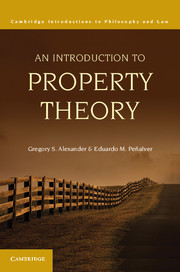4 - Kantian Property Theory
Published online by Cambridge University Press: 05 June 2012
Summary
Among American legal theorists, interest in Immanuel Kant’s theory of property has never been as strong as it has been in the theories of Locke, the utilitarians, and even Hegel. Nevertheless, a brief look at Kant’s approach to property is appropriate not only because of Kant’s general philosophical importance, but also because there are signs of awakening interest in Kant’s private law theory among North American legal theorists.
For Locke and Hegel, property is in some sense an extension of the person. Hence, for both, initial acquisition is the normative basis of ownership. Kant’s concern, including his consideration of property, is individual freedom, defined as “independence from being constrained by another’s choice.” The key question in terms of property is, how can free persons interact with one another in using and possessing property while remaining independent?
- Type
- Chapter
- Information
- An Introduction to Property Theory , pp. 70 - 79Publisher: Cambridge University PressPrint publication year: 2012

